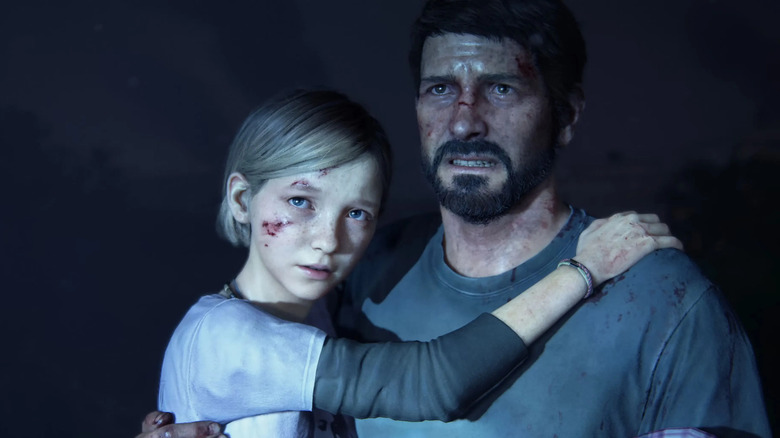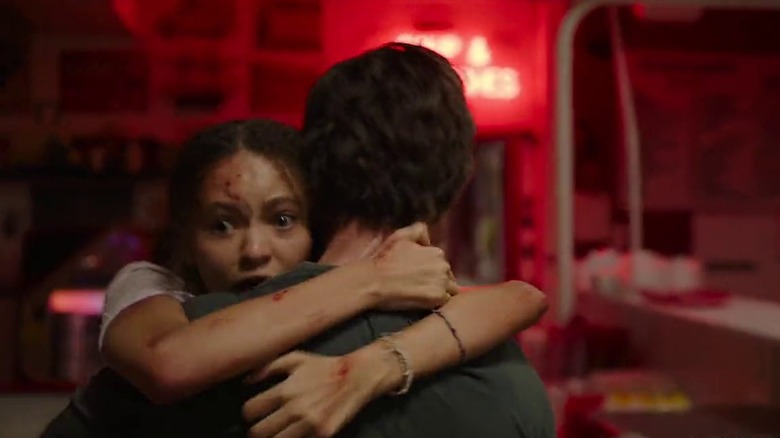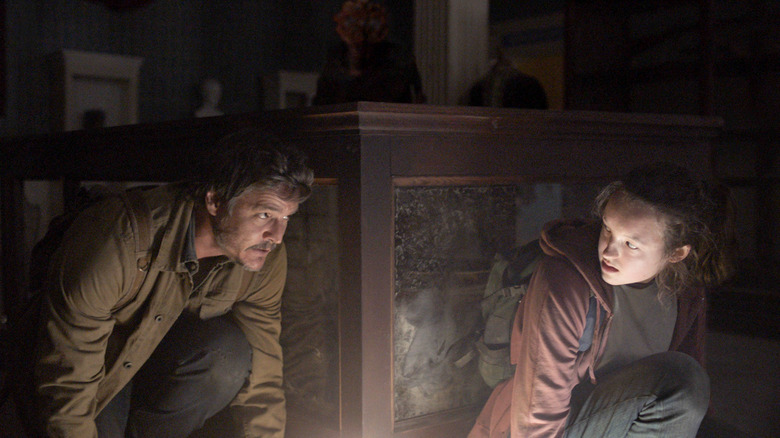Why Aging Up Joel's Daughter For HBO's The Last Of Us Was The Right Choice
This post contains spoilers for the first episode of "The Last of Us," as well as the entire video game.
Of all the changes and expansions that "The Last of Us" pilot has made from the game it's based on, it's the changes to Joel's daughter that are perhaps the most inspired. TV Sarah (Nico Parker) plays the same basic role in the story as game Sarah (Hana Hayes), but the show has added a level of depth to the character that the original never quite had.
That's not a dig on the source material, of course; the main appeal of the game is that you get to play as the characters and make decisions for them, so it makes sense that you don't get too much time developing this father-daughter relationship before the apocalypse hits. In the game, we only get about two minutes of the characters interacting, which means the writers need to keep things simple. We see Sarah give her dad the fixed watch and we listen to her make a joke about how she sold drugs to get the money to fix it, and that's enough to make her death shortly afterward appropriately devastating.
But more than anything, the TV show has the advantage of time. The first episode slows things down and shows us exactly how Sarah fixes Joel's thematically-important watch, which involves her stealing some of her father's money. It's a plot point that elaborates on the short interaction from the game, one that both establishes TV Sarah as less innocent than game Sarah, but shows that she cares about her father just as much.
The downside to game Sarah's age
Although at first it might seem like a mistake for the show to make Sarah a little older and complicate her relationship with Joel, ultimately it's a choice that enhances the themes of the story instead of diminishing them. The main benefit of this change, beyond simply making Sarah feel like a real person, is that it makes Joel's actions in the rest of the show a little more sympathetic.
In the game, there's a significant stretch in the summer period where Joel refuses to let Ellie use a gun. He doesn't trust her to handle it on her own, and he doesn't trust her to take care of herself in general. While it's understandable where Joel is coming from here, it's also a kind of frustrating section of the game, in part because we all know where this is heading. It's basically inevitable that Ellie is going to soon prove herself as a capable fighter and Joel is going to learn to lighten up a little.
The other reason it's a little frustrating is because although Joel sees his daughter in Ellie, we know that Ellie is not as helpless as Sarah was. Not only is she older than Sarah, but she's grown up in a much more dangerous world that's made her better suited to handle these situations. Joel's fears for her are reasonable, but from a meta standpoint, they're sort of annoying. It makes you want to just fast-forward and get to the part where Ellie's allowed to be the badass we know she is.
The upside to aging Sarah up
Although Joel is likely to go through the same sort of character arc in the TV show, it already primed to go down a little more smoothly. Not only have TV audiences been given more time to grow attached to Sarah, but we've also seen how capable she is. There are times in the pilot where she feels more like Joel's mother than his daughter, cooking breakfast for him and making sure he gets his vitamins. This version of Sarah is far more competent than game Sarah ever was, and she still dies the exact same way.
Other adaptations — "Game of Thrones" comes to mind — have gotten into trouble for exactly this sort of thing. Most of that show's problems in its later seasons came down to the writers sticking to the same plot points of the original books, even though the characters had been changed enough by then that the plot point no longer worked. (The resolution to the Shae subplot in season 4 is probably the best example.)
But for "The Last of Us," this writing choice only makes the story better. Giving a different Sarah the same ending makes Joel's later paranoia over Ellie's safety far more understandable, because we've learned along with him that being tough for your age doesn't always matter. TV Sarah's death teaches Joel a lesson that'll be a lot harder to unlearn, and that puts him in a more compelling place going forward. "The Last of Us" might only be one episode in, but it's already building on the source material in an impressive, incredibly promising way.


